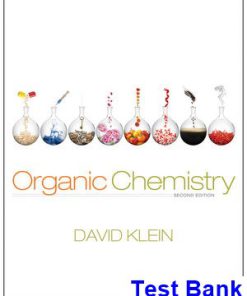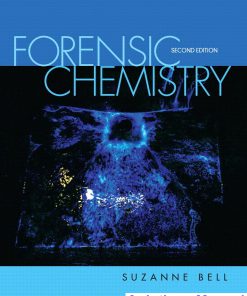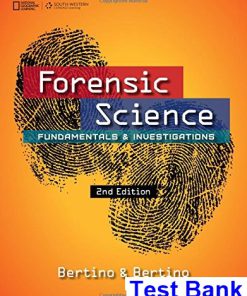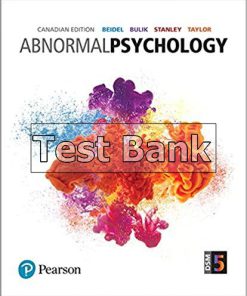Forensic Chemistry 2nd Edition Bell Test Bank
You may also like
-
$26.50
$50.00 -
$26.50
$50.00
Forensic Chemistry 2nd Edition Bell Test Bank

Product details:
- ISBN-10 : 0321765753
- ISBN-13 : 978-0321765758
- Author: BELL
The first text to specifically address this growing field, Forensic Chemistryintroduces the principal areas of study from the perspective of analytical chemistry–addressing the legal context in which forensic chemistry is conducted, types of samples and matrices, variety of sample types encountered, and extensive use of instrumentation. It provides a solid foundation for basic chemistry, introducing chemical concepts and practices from a forensic perspective (including multivariate statistics, quality assurance/quality control, and protocols used in working forensic laboratories). The Second Edition has been reorganized significantly, and updated to reflect new developments in the course.
Table of contents:
Chapter 1- Introduction and Overview- Chemistry and the Law
1.1 What is Forensic Chemistry?
1.2 Precedent in Chemistry and the Law
1.3 Key Forensic and Legal Concepts
1.4 The Flow of a Forensic Analysis
1.5 The Forensic Mind-Set
1.6 Forensic Chemistry Today
1.7 Becoming and Being a Forensic Professional
PART 1- METROLOGY
Chapter 2- Foundations
2.1 Metrology and Measurement
2.2 Significant Figures, Rounding, and Uncertainty
2.3 Fundamental Statistics
2.4 Error, Accuracy, and Precision
2.5 Hypothesis Testing
Chapter 3- Quality Assurance and Quality Control
3.1 Quality Assurance and Quality Control
3.2 Quality Control Procedures
3.3 Quality Control and Calibration
Chapter 4- Reporting Defensible Uncertainty and Obtaining Representative Samples
4.1 Uncertainty
4.2 Sampling and Sampling Plans
PART 2- CHEMICAL FOUNDATIONS
Chapter 5- Chemical Fundamentals: Partitioning, Equilibria, and Acid/ Base Chemistry
5.1 General Considerations
5.2 An Introductory Example
5.3 The Special K’s
5.4 Partitioning
5.5 Partitioning with a Solid Phase
5.6 Extension of Partitioning: Thin-Layer Chromatography
Chapter 6- Instrumentation
6.1 Microscopes and Chemical Microscopy
6.2 Spectroscopy
6.3 Mass Spectroscopy
6.4 Elemental Analysis
6.5 Microspectrophotometry
6.6 Electrophoretic Instrumentation
PART 3- DRUGS AND POISON
Chapter 7- Drugs as Physical Evidence: Seized Drugs and Their Analysis
7.1 What is a Drug?
7.2 Classification and Categories
7.3 Drugs as Evidence
7.4 Analysis of Seized Drugs
Chapter 8- Forensic Drug Analysis II: Selected Drug Classes
8.1 Acidic and Neutral Drugs
8.2 Basic Drugs
Chapter 9- Drugs in the Body
9.1 Introduction
9.2 ADME
9.3 Compartment Models
9.4 Absorption
9.5 Metabolism
9.6 Elimination
9.7 An Integrated Approach
9.8 Dosage Considerations
9.9 How Drugs Work
Chapter 10- Forensic Toxicology
10.1 Sample Types
10.2 Categories of Forensic Toxicology
10.3 Analytical Methods
PART 4 COMBUSTION EVIDENCE
Chapter 11- The Chemistry of Combustion and Arson
11.1 The Combustion Continuum
11.2 Aspects of Combustion
11.3 Flames and Fires
11.4 Arson and Fire Investigation
Chapter 12- Explosives
12.1 Explosions, Detonations, and Explosives
12.2 Explosive Power
12.3 Forensic Analysis of Explosives
Chapter 13- Firearms and Associated Chemical Evidence
13.1 How Guns Work
13.2 Primers and Propellants
13.3 Forensic Chemical Analysis of Firearms Evidence
13.4 Serial Number Restoration
PART 5 MATERIALS
Chapter 14- The Chemistry of Colors and Colorants
14.1 Color: A Quantitative View
14.2 Colorants
14.3 Application of Colorants: Inks
14.4 Applications of Colorants: Mechanical and Computer Printing
14.5 Applications of Colorants: Paint
Chapter 15- The Chemistry of Polymers
15.1 Polymers
15.2 Biopolymers: Polysaccharides
15.3 Synthetic Polymers
Chapter 16- Forensic Analysis of Inks and Paints
16.1 Analytical Methods
16.2 Aging and Dating
Chapter 17- Chemical Analysis of Materials I: Paper, Fibers, and Plastic
17.1 Analysis of Materials: An Overview
17.2 Analysis of Paper
17.3 Fibers
People Also Search:
forensic chemistry definition
what is forensic chemistry in criminology
define forensic chemistry
forensic chemistry examples
forensic chemistry and forensic toxicologist similarities
forensic chemistry analytical techniques
application of forensic chemistry
Forensic Chemistry 2nd Edition Suzanne Bell Solutions Manual













